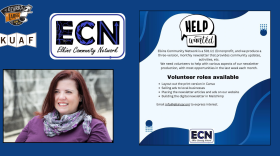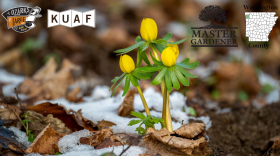Aaron Elam runs a unique hair salon. For one, he operates it out of a converted airstream trailer. Hence its apt name: Hairstream.
It’s located right off the Greenway in South Fayetteville. Elam said the uncommon nature of his salon draws many walk-up customers.
"We've been open over two years now down at this location," Elam said. "And when I found the spot, you know, I was like, 'This is perfect. The Greenway bike trail's right next to us- MLK is right in front of us.' So it's been perfect down here. I've just been doing what I love, and this isn't work to me. Because, like I said, I like to talk, and then my clients are my artwork. They're like my art pieces. So, it's where I wanted to get with my career and to have an awesome place to do what I love and make people pretty. That's one thing that I love and why I wanted to do hair is just kind of, you know, sometimes you get someone that comes in, maybe they don't feel that great about themselves or like 'My hair has been bugging me, I just feel, you know, frumpy,' whatever the case may be. And it's fun to just transform that and get rid of that and bring in a new excitement about it. They're like, 'Oh, I love my hair.'"

Another special aspect of Hairstream is what happens to clients’ hair clippings after they’re snipped.
After every haircut, Elam sweeps the floor, collects the hair and bags it up. He said that ultimately he’ll donate the hair and, down the line, it’ll be used to help clean oil from waterways.
Elam said this idea came about the way many great ideas seem to occur nowadays, through mindless internet scrolling.
"So one night, I came home from work, and I was just on the internet, and I was Googling some stuff and nothing, nothing hair or work-related," he said. "And all of a sudden below Google, you know, there's sometimes little stories that pop up and, and I saw, there was this organization called Matter of Trust out in California, in San Francisco."
Matter of Trust is a nonprofit that collects discarded fibers like hair, dog fur, fleece and wool to weave oil-absorbing mats that are then used to clean storm drains, rivers, lakes and oceans.
Elam said working with Matter of Trust seemed like a great way for Hairstream to give back to the planet it occupies.
"I saw that and I was like, 'Oh my gosh, that's really cool.' And, you know what? I have access to a lot of hair that I could send in and contribute.' And us as humans, we do a number to this Earth, and we only have one Earth. So I was like, 'This would be a good way to kind of give back and help save the environment.' I love to hike and go out in nature a whole lot. I have a big German Shepherd. So he and I go out a lot, and we like to be outdoors, and we like to be around lakes and rivers and the ocean. I brought him out to the ocean several times out in California."
Lisa Gautier founded Matter of Trust in 1998. She says that her mission has been to link surplus with need since the beginning. It all started when Gautier moved to San Francisco in the late 90s and took up her mom’s old apartment, which was already furnished. The trouble was Gautier already had plenty of goods to move into the new space:
"So we had double the stuff, and I found a school that could use like a little sofa and rug for a storytime area," Gautier said. "And it was just such an amazing school, John Muir School here in San Francisco. There was one principal paid position, but two women were working full time, sharing the salary because 50% of the population was in homeless shelters. And it was just this amazing, amazing school. They were just making it such an amazing place. So, I asked them if they needed anything else. And we got our first wish list."
As Gautier acquired items for the school, she always received more items than she had asked for, which wasn’t necessarily a bad thing. The surplus she encountered allowed her to realize a startling disconnect between what some people have and what others need.
She continued her work, reaching out to other charities and attempting to fulfill their needs. She said she began working with environmental groups by following her passion for ecology and activism.
"We talk about the environmental movement being a lot about scarcity," she said. "But because we work a lot with youth, I really want to concentrate on the optimism and positive things, and I find that when you talk about how nature is very abundant, and there's when you're linking surplus with needs, there's a lot of surplus in nature. And so we we started to look at natural things as well. And that led us to the waste fibers, hair fur fleece etc. And that's really become one of our flagship programs. It's kind of a unique niche, and people just love talking about it. Everybody's growing their own hair so that everybody can see that it's going to waste."
In 1999, Gautier met Alabama hairdresser Phil McCrory. He had developed a mat woven of human hair to be used for cleaning oil after watching a spill’s clean-up on television. He witnessed a sea otter completely covered in the substance and concluded that if animal fur traps oil, so would human hair.
Gautier said that her surplus-based donations and McCrory’s revolutionary invention meshed perfectly. Soon after their meeting, she was collecting hair from salons across the country, weaving them into mats and employing them for a wide range of uses. Fast forward one decade:
"In 2010, we were involved in the BP oil spill," Gautier said. "And so we worked a lot with private beaches and places like that. There were a lot of amazing people there. I went to the South several times and got to work with people collecting hair and fibers from zoos and pet groomers and everything. And sometimes you'd have up to 6000 volunteers a day, it was just- the South is just amazing. So so kind and so generous. Anyway. So a lot of that got used after the oil spill. Because during the spill, it was very litigious. And there was a lot going on with BP but the amazing part of that was that I got to meet this team of people. So we met these wonderful people through the Coast Guard, who introduced us to the Navy, who introduced us to the Army Corps of Engineers, and a program there got absorbed by the Air Force. And we've been working with him ever since many years on a large contaminated reservoir filtration system. And that's one of our biggest projects is looking at all of the contaminants that work with petrochemicals. So that's a big project for us."
Gautier says that Matter of Trust mostly uses their mats to filter oils from the water collected by storm drains. In fact, 50% of contaminants that enter waterways originate from streets. Rain, fog, and snow all mix with oils from cars and asphalt and flow into our streams, rivers and eventually oceans.
"It's not as sexy," Gautier said. "But it's really where we want to concentrate and just work with cities everywhere to just put these mats into storm drains."
Gautier says that Matter of Trust’s goal is to establish 300 felting centers across the globe by 2030 so local fibers can assist local solutions. Today they’re at 111. They wouldn’t be there if it weren’t for salon owners like Hairstream’s Aaron Elam.
He said his clients are usually very excited to learn their hair will be used for a greater purpose.
"They're like, 'Oh, my gosh, that's cool. I never thought about that,'" Elam said. "And they kind of have the same reaction I had when I tell them about it. And they're like, 'Okay, yeah, there. We don't need that old hair anyways.' And I actually call it the old-news-ends. That's the old hair that I cut off. I'm like, 'Oh, yeah, you need to get rid of your old-news-ends."
You can visit our website for more information about Matter of Trust, Hairstream and how you can get involved, even by just booking a haircut.
Ozarks at Large transcripts are created on a rush deadline by reporters. This text may not be in its final form and may be updated or revised in the future. Accuracy and availability may vary. The authoritative record of KUAF programming is the audio record.








